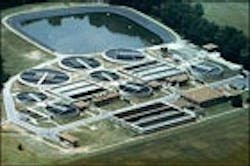Clean Water Council Encourages Including HR 537 in Latest Jobs Bill
The Clean Water Council (CWC) encourages inclusion of the Sustainable Water Infrastructure Investment Act (HR 537) in the latest jobs bill under consideration in the House of Representatives. Introduced by Rep. Bill Pascrell (D-N.J.), the legislation would eliminate the state volume cap on private activity bonds (PABs) for water and wastewater infrastructure projects, which would significantly increase opportunities for private investment in an essential construction market, CWC said. PABs provide tax-exempt financing for states and municipalities looking to partner with a private entity to meet a public need.
"At a time when unemployment in the construction industry exceeds 24%, this bill is sorely needed to get America's construction industry back to work," said Bill Hillman, CEO of the National Utility Contractors Assn., a managing member of the CWC. "In addition to enhancing public health and protecting the environment, investment in this infrastructure creates high-paying jobs, generates significant economic activity and expands the local tax base."
A recent CWC study found that every $1 billion invested in water and wastewater infrastructure creates up to 27,000 new jobs with average annual earnings of more than $50,000, increases national output (i.e., demand for products and services) by up to $3.46 billion and more than $1 billion in household (personal) income. Importantly, the study also found that each $1 billion invested generates approximately $82.4 million in state and local tax revenue.
It is estimated that lifting the cap on PABs could generate as much as $5 billion annually in incremental private capital for water and wastewater infrastructure projects at a very low cost to government ($214 million over 10 years).
"Despite the job creation and economic benefit that comes with financing these projects, recent jobs legislation has not included sufficient investment in water infrastructure," Hillman said. "Including HR 537 in the next jobs bill would provide huge opportunities for investment in these essential projects that put countless Americans to work and generate significant economic activity while refurbishing this essential infrastructure at the same time."
Source: Clean Water Council
